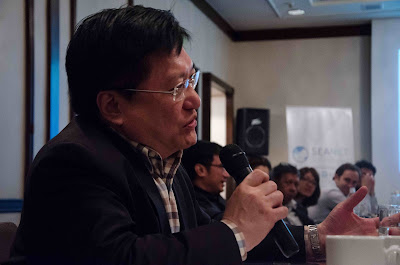------------
21 February 2016
Following the three-day Asia Liberty Forum organised by
ATLAS Network, the Centre for Civil Society and the Institute for Democracy and
Economic Affairs (IDEAS), the Southeast Asia Network for Development (SEANET)
held a workshop for think tank and business leaders, and academicians from
around the world. The focus of the workshop was the development of
business-friendly regulations in Southeast Asia.
The structure of the workshop was divided into
presentations from various experts in free trade, followed by an open
discussion between all workshop attendees. Julian Morris, of the Reason
Foundation, shared how the introduction of innovative business models, combined
with scale-backs on regulations, have led to massive improvements in quality of
life, such as the greater travel convenience offered by companies such as
GrabCar and Uber. Morris also highlighted how free market innovation has led to
market solutions for harmful products, such as alternatives to cigarettes in
the form of e-cigarettes. Such examples demonstrate that there are more viable
alternatives to aggressive government centralisation.
Following Morris’ presentation, various attendees related
of the threats to freedom of choice and the market inefficiencies caused by
heavy regulations on tobacco. They mentioned how organisations such as the
WHO’s Framework Convention on Tobacco Control (FCTC) are creating a forceful
environment where there is an abuse of lawful processes and a neglect of the
sovereignty of governments. Le Dang Doanh, an economist from Vietnam, shared
how the vast amount of regulations on private sector industries has bred a
culture of corruption in Vietnam, where business leaders are coerced to paying
off public officials simply to obtain an operation permit. Such regulations
have also severely limited the contribution of the private sector to the
country’s GDP, which now stands at only 11.2%.
The workshop attendees then shifted gears from the
current situation of regulations on businesses to share ideas on advancing the
liberal agenda for the future. Sethaput Suthiwart-Narueput, of Thailand Future
Foundation, offered three suggestions as to how think tanks can enhance a business
friendly environment in their countries.
Firstly, Suthiwart-Narueput
emphasised the need to reframe the current debate in a way that is applicable
to the Asian context, in that the jargon used and the issues addressed must be
localised for Asian societies. In addition, think tanks have to choose their
battles and issues carefully, aiming to persuade parties caught in the middle
ground rather than battling hard against opposing NGOs or governments. Lastly,
there is need for regional collaboration between think tanks in different
countries.
Wan Saiful Wan Jan, CEO of IDEAS, urged businesses and
think tanks alike to establish connections with governments so as to open
avenues for collaboration for market liberalisation, while Azrul Khalib from
IDEAS mentioned the importance of research on the benefits of deregulation in
persuading civil society to embrace free market principles. Various
participants also pointed out the impact of media in advocating deregulation
through applying public pressure on politicians.
In conclusion, the exchange of ideas, experiences and
challenges between the diverse body of attendees in this workshop served to
reaffirm the importance of collaboration between think tanks, businesses and
academic institutions in championing liberal ideals in Southeast Asia.
-------------
See also:
Business Bureaucracy 9, Land title registration, July 29, 2015
Business Bureaucracy 10, WB's Doing Business 2016 Report, October 29, 2015
Energy Econ 12: EPIRA, WESM, PSALM and DOE Bureaucracy, January 28, 2014
BWorld 5, Transportation Bureaucracy and Uber, June 16, 2015
BWorld 19, Taxation and regulations in PH mining industry, September 24, 2015
BWorld 23, ASEAN trade bureaucracies and Doing Business 2016 Report, November 07, 2015
IPR and Innovation 31, On TPP, medicines patent and tobacco trademark, February 29, 2016
IPR and Innovation 31, On TPP, medicines patent and tobacco trademark, February 29, 2016



No comments:
Post a Comment